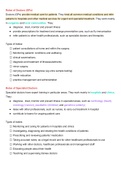Roles of Doctors (GPs)
Doctors (GPs) provide medical care for patients. They treat all common medical conditions and refer
patients to hospitals and other medical services for urgent and specialist treatment. They work mainly
in surgeries and local communities. They:
● diagnose , treat, monitor and prevent illness
● provide prescriptions for treatment and arrange preventative care, such as flu immunisation
● refer patients to other health professionals, such as specialist doctors and therapists
Types of duties:
patient consultations at home and within the surgery.
Monitoring patients' conditions and wellbeing.
clinical examinations.
diagnosis and treatment of illnesses/ailments.
minor surgery.
carrying out tests to diagnose (eg urine sample testing)
health education.
practice management and administration
Roles of Specialist Doctors
Specialist doctors have expert training in particular areas. They work mainly in hospitals and clinics.
They:
● diagnose , treat, monitor and prevent illness in specialist areas, such as cardiology (heart),
oncology (cancer), paediatric (children) and geriatrics (elderly)
● liaise with other professionals, such as nurses, to carry out treatment in hospital
● contribute to teams for ongoing patient care
Types of duties:
Monitoring and caring for patients in hospitals and clinics
Investigating, diagnosing and treating the health conditions of patients
Prescribing and reviewing patients’ medication
Taking accurate notes, as a legal record and for other healthcare professionals to use
Working with other doctors, healthcare professionals and management staff
Educating people about their health
Teaching and supervising trainee doctors
, Roles of Nurses
Nurses plan and provide medical and nursing care to patients in hospital, at home or in other
settings who are suffering from chronic or acute physical or mental ill health. Nurses work as part of a
team of professional and medical staff that includes doctors, social workers and therapists.
Nurses are trained to carry out medical duties at their level of seniority and specialism, mainly in
hospitals, surgeries, clinics and homes. Specialisms include hospital critical care nursing,
cardiac nursing, surgical care and oncology nursing. Nurses:
● monitor and care for the daily chronic and acute medical needs of patients
● support doctors in giving treatment and prescribed drugs
● work to restore health and wellbeing
Typical duties of the job include:
assessing and planning nursing care requirements
providing pre- and post-operation care
monitoring and administering medication and intravenous infusions
taking patient samples, pulses, temperatures and blood pressures
writing records
supervising junior staff
organising workloads
providing emotional support to patients and relatives
tutoring student nurses
Roles of Midwives
The midwife's role is to provide skilled, knowledgeable, respectful, and compassionate care for all
women, newborn infants and their families. They work across the continuum from pre-pregnancy,




